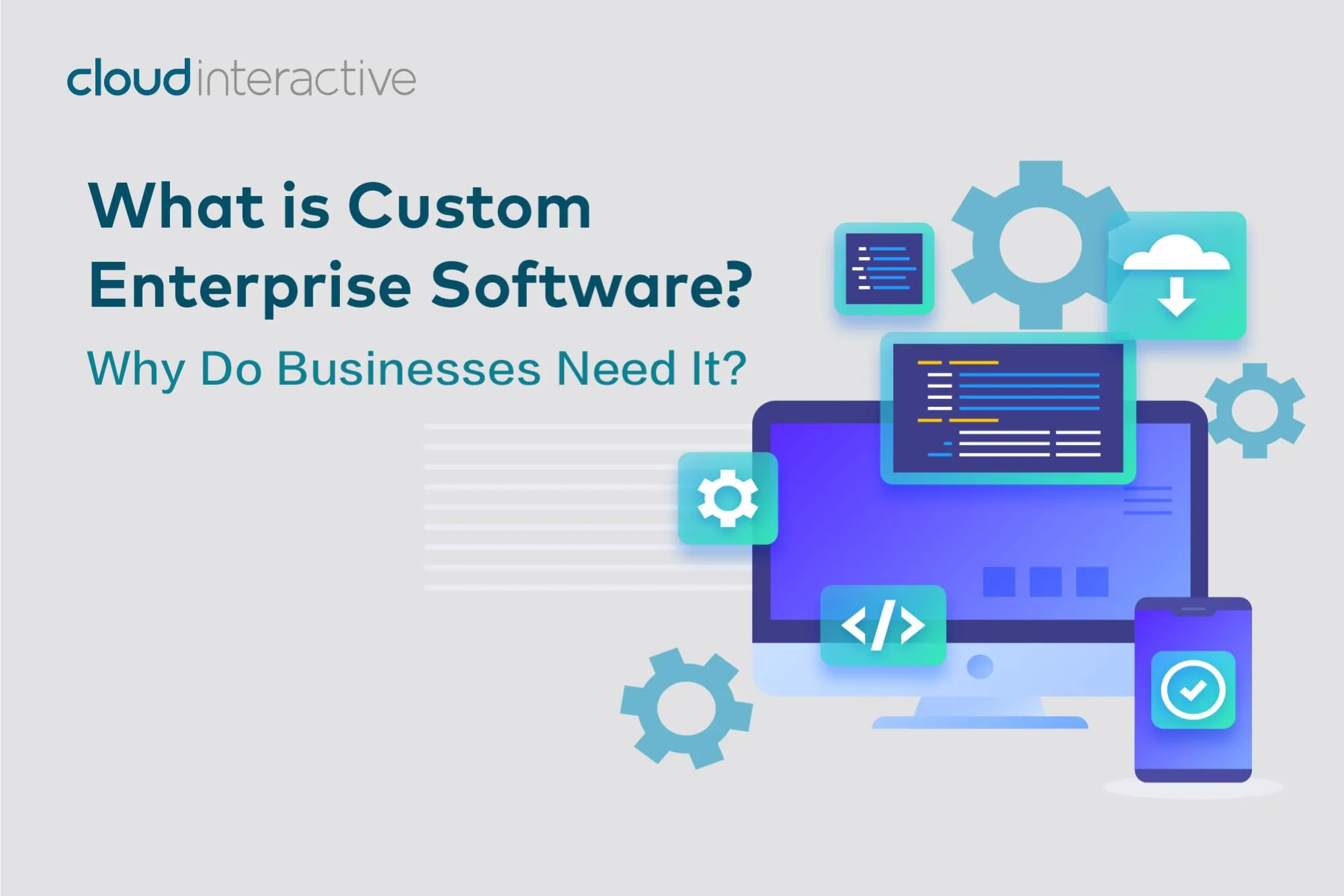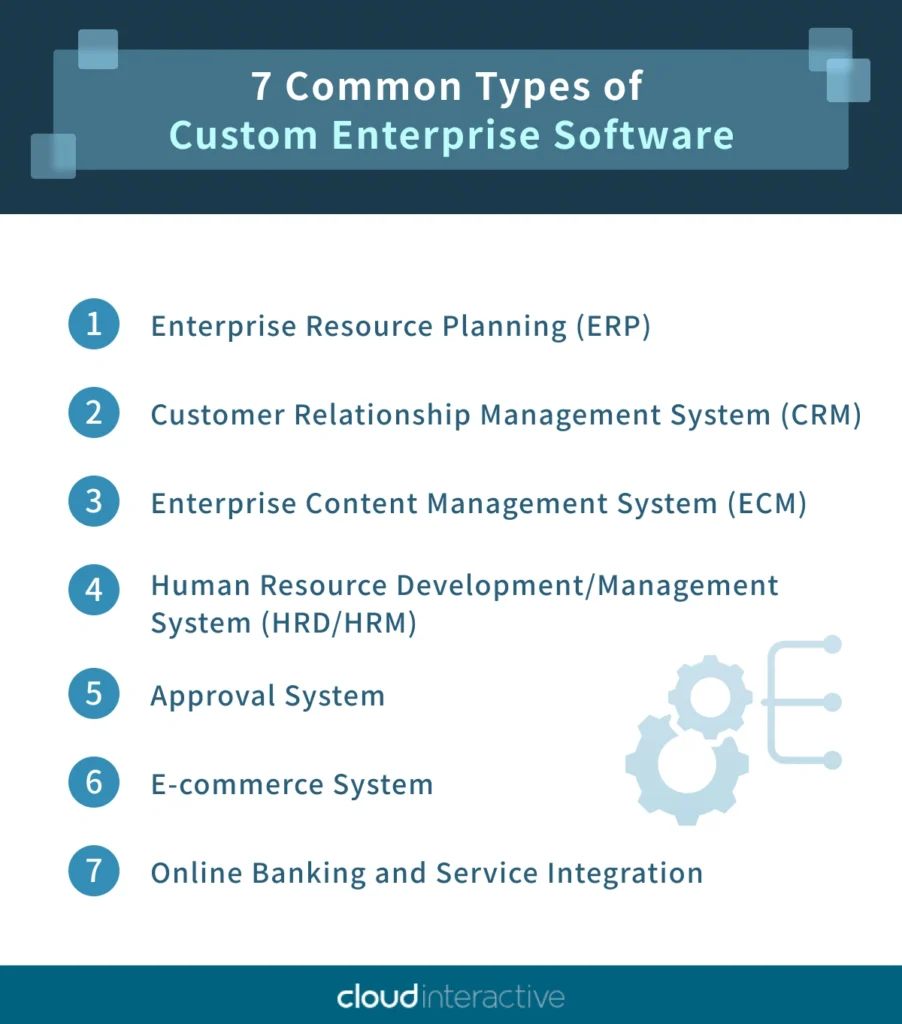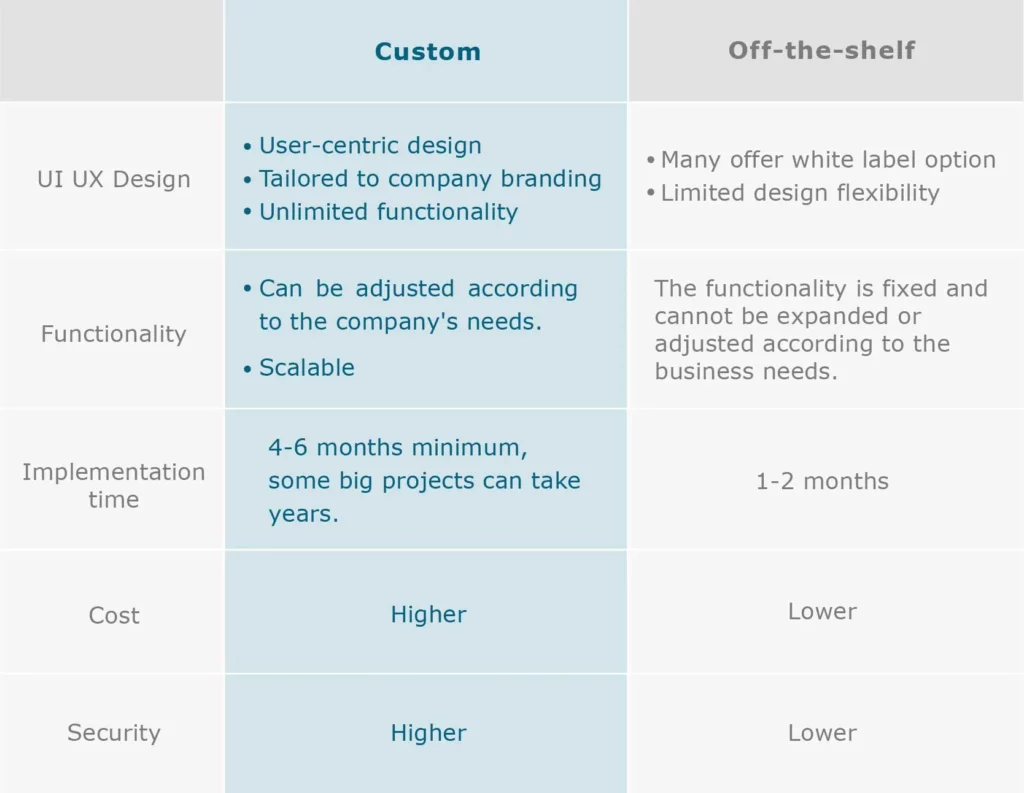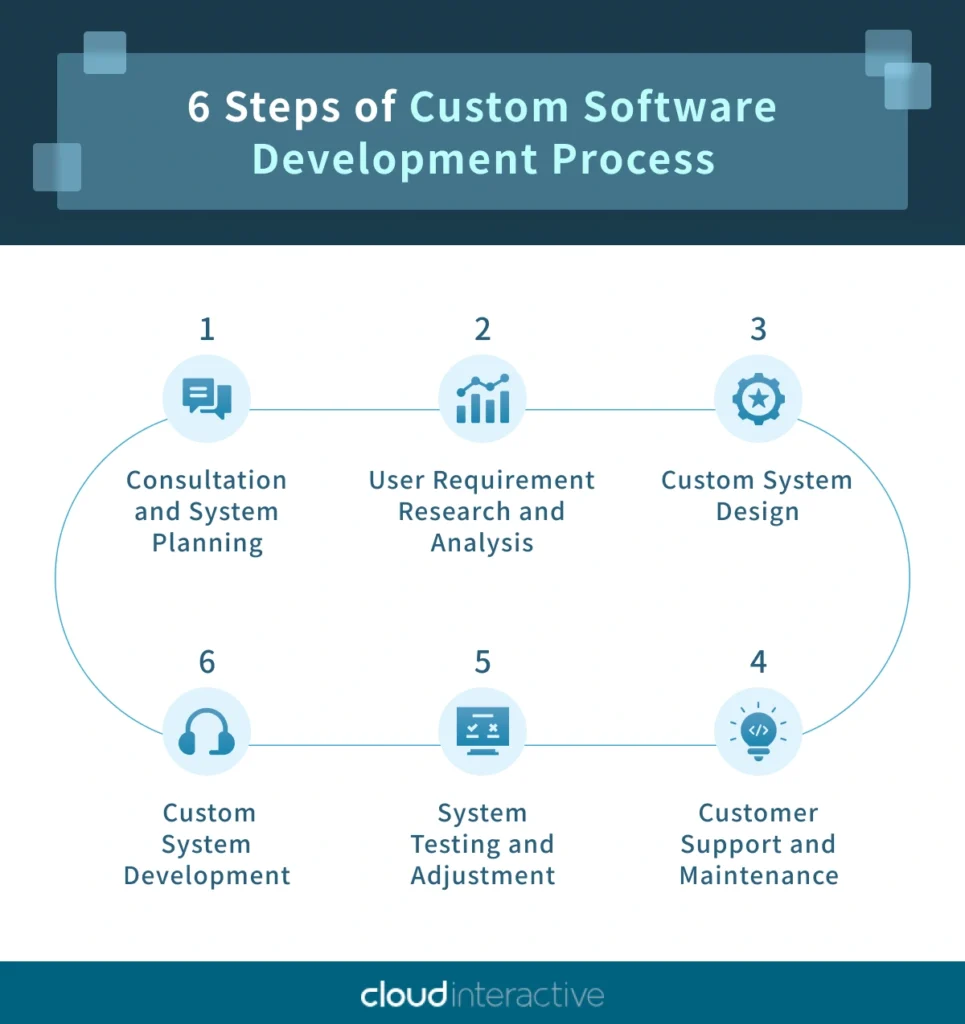
Behind the Scenes: What’s Enterprise Custom Software Development
This article introduces custom enterprise software, providing a comprehensive comparison and case studies of enterprise software development.
In the era of digital transformation, businesses are steering towards growth by embracing technological advancements. However, choosing between custom or off-the-shelf enterprise software isn’t just a concern of the price, but also a strategic decision that impacts the efficiency, scalability, and long-term success of the organization.
This article will introduce the different types of custom enterprise software, their advantages, and the development process, followed by some successful case studies.
If you are looking into custom enterprise software development, we hope this will provide you with valuable insights for informed decision-making.
What is Custom Enterprise Software? Why Do Businesses Need It?
Custom enterprise software refers to tailor-made software solutions designed and developed to meet the specific needs, requirements, and workflows of a particular organization or business. Unlike off-the-shelf software, custom enterprise software is built from the ground up, considering the unique processes, challenges, and goals of the enterprise.
This type of software is characterized by its ability to scale, handle complex tasks, and support various business processes within an organization. Businesses use enterprise software to streamline and optimize internal workflows, enhance communication and collaboration, manage resources, and facilitate overall business operations.
What Are The Types of Custom Enterprise Software?

1. Enterprise Resource Planning (ERP)
Enterprise Resource Planning (ERP) is a software solution that unifies various business processes and functions across an organization into a cohesive system, which covers core business functions such as finance, human resources, supply chain management, manufacturing, and customer relationship management. By establishing a centralized platform for managing and analyzing data from various departments, ERP provides real-time insights, enhances efficiency, and improves decision-making and communication.
The primary goal of ERP is to enhance efficiency, improve decision-making, and facilitate communication by providing a centralized platform for managing and analyzing data from different departments.
2. Customer Relationship Management System (CRM)
A Customer Relationship Management (CRM) system is a sophisticated solution that enables organizations to streamline the creation, organization, storage, and retrieval of digital content. Enterprises can customize the system to enhance collaboration, simplifying workflow management, and optimizing decision-making processes across departments.
3. Enterprise Content Management System (ECM)
Enterprises customize the system to enhance collaboration, workflow management, and decision-making processes across departments within the organization.
4. Human Resource Development/Management System (HRD/HRM)
Human Resource Management System (HRM) streamlines the HR department’s processes, making it easier to organize personnel files, simplify attendance and salary record-keeping, and eliminate complex paperwork. When integrated with the Human Resource Development System (HRD), it efficiently catalogs the capabilities of internal staff, enabling the precise planning of training courses tailored to the unique needs of different team members, ultimately enhancing overall employee skill sets.
5. Approval System
Online approval software is designed to streamline and automate the process of obtaining approvals for various documents, projects, or workflows within an organization. This software facilitates efficient collaboration by allowing users to submit, review, and approve documents electronically.
The goal is to enhance workflow efficiency, reduce approval times, and provide a centralized platform for managing and monitoring approval processes in real-time.
6. E-commerce System
7. Online Banking and Service Integration
Online banking apps are customized systems that seamlessly integrate various financial services, such as loan processing, credit card applications, and investment management, providing users with a portable banking experience that fits comfortably within the grasp of a single hand. This evolution surpasses traditional brick-and-mortar banking, enabling users to access financial services at any time and from anywhere.
Custom vs. Off-the-shelf Enterprise Software
However, companies often face a dilemma between off-the-shelf systems and custom-developed enterprise software. To help companies make informed decisions, we provide an analysis of the pros and cons of customized and template systems. We also suggest suitable scenarios for each type of system, enabling companies to determine which one is best suited to their specific situations.
1. Custom Enterprise Software
Pros
- Tailored to meet specific business processes.
- Allows real-time adjustments and expansions based on company needs.
- The development company provides post-sales service, ensuring system maintenance, operation, and technical support to enhance security and stability.
- Allows the fulfillment of all business requirements simultaneously.
- Ability to scale the system as the business expands.
Cons
- Higher upfront cost.
- Overall implementation cost includes initial planning, development, and testing.
- Longer development time compared to off-the-shelf solutions.
Therefore, companies that require high customization, focus on data security, need system compatibility and flexibility, and have sufficient resources and time for development are better suited for choosing enterprise custom software development. This allows them to fulfill all their business requirements at once and undertake additional development to address various user requirements in the future.
2. Off-the-shelf Software
Pros
- More affordable compared to building a customized system from scratch.
- Quick and easy implementation.
Cons
- Limited flexibility to adjust or expand functionalities based on company needs.
- Potential compatibility issues with existing systems may lead to data isolation.
- Lower security and stability levels.
Off-the-shelf software is suitable for small organizations with limited budgets, tight timelines, or no plans for expansion or additional functionality.

6 Steps of Enterprise Custom Software Development Process

1. Consultation and System Planning
Before building a custom system, a thorough understanding of the enterprise’s current system requirements is crucial. This involves a comprehensive analysis and assessment of user groups, essential features for the custom system, and the envisioned objectives.
2. User Requirement Research and Analysis
After understanding the requirements, the collection of user experiences begins. Custom systems are designed based on user habits. Custom systems are crafted with a focus on user habits. For example, if a system is tailored to consumers, diligent research into current market trends and industry preferences is undertaken to align with consumer choices.
3. Custom System Design
After consultation with the requirements and user research, the planning and design of the custom system begin, covering aspects such as software development methods, programming languages, and interface design.
4. Custom System Development
The development stage of the enterprise custom system involves collaborative efforts between the design and development teams to construct software that perfectly aligns with the specified requirements.
5. System Testing and Adjustment
As the system progresses to a specific development stage, a meticulous testing phase is implemented. This involves collecting user data and feedback and systematically adjusting the system to attain optimal quality.
6. Customer Support and Maintenance
Upon the system’s official launch, user education and guidance can be provided upon request by the customer. The software development company will carry out regular maintenance updates to ensure the system’s stability and security.
Case Studies
Custom Web Application | Renesas Synergy Platform
Cloud Interactive has developed a web application called “Renesas Synergy Platform” for Renesas Electronics. This platform is designed to provide a user-friendly interface to connect various products and services that consumers may need. The ultimate goal is to establish a comprehensive sales and customer service chain that provides a seamless consumer experience, thereby enhancing brand loyalty. Cloud Interactive has analyzed industry trends and competitors to design an interface that is easy for consumers to navigate and browse, allowing them to order products with ease.
On the backend, the platform provides user behavior analysis data that sales and marketing teams can use to make informed business decisions. With the help of our enterprise software development services, Renesas established an internal database that consolidates the company’s vast and complex product data. This expedited enterprise decision-making and accelerated the availability of past data for quick access during product development.
Custom Content Management System (ECM) | DKSH Dr. Talk
DKSH aimed to establish an online learning platform that would enable healthcare professionals to stay current with the development of medical technology and access the latest medical knowledge in real-time.
Cloud Interactive provided enterprise custom software development services to create the Dr. Talk online learning platform for DKSH. The platform encompassed features such as course planning and assessment areas, collecting valuable data on user interactions, class participation, subscription details, and course certifications. Leveraging this data, adjustments were made to the course content, ultimately enhancing the overall learning experience with a focus on quality.
The backend of Dr. Talk could integrate with Line’s (a popular communication app in Taiwan, similar to WhatsApp) official account and chatbot, ensuring data integrity while enhancing accessibility and website stability. Additionally, a dashboard was set up in the backend to collect user data in graphical form, facilitating enterprise analysis and management of courses and users.
Custom Enterprise Resource Planning (ERP) | Global B2B E-commerce System for a Leading Plastics Group
Interested in more Custom Software Development case studies?
Click the button below to learn more about our case studies.
Custom Enterprise Software Development Company | Cloud Interactive
Cloud Interactive is a company that specializes in building custom systems for different industries, including web applications, ERP, and content management systems. Our team of experienced developers and designers focuses on human-centered design philosophy, information security, and industry-specific solutions. We are flexible in our development methodologies to meet the specific business requirements of our clients.
Our Strength
Innovative Design and Development Team at an Affordable Price
Emphasis on Information Security
As a trusted software development partner, we prioritize information security and have successfully served numerous large multinational enterprises and financial sector clients. You can confidently entrust your systems to us, as we have obtained various information security certifications to ensure the security of your data.
Human-Centric Design Philosophy
Our services in custom enterprise software development are grounded in the fundamental philosophy of “human-centric design,” prioritizing the enhancement of user interaction experiences. Our goal is to design user-friendly systems that provide a seamless experience for users.
Flexible Project Management and Development Approaches
Our project management team guarantees smooth communication and collaboration, both within the team and with external stakeholders. We provide a versatile approach to custom software development for enterprises, tailoring product development paths to project progress using the agile software development methodology. Alternatively, we employ the waterfall development method, emphasizing meticulous product planning and development processes.
By Cloud Interactive
Meet the masterminds behind the curtain at Cloud Interactive. We're not just software developers - we're also a content crew fuelled by caffeine and a thirst for knowledge. We translate tech jargon into plain English, dissect industry trends, and craft helpful tips that are informative and engaging. So, buckle up and join us on a journey through the ever-evolving and exciting world of technology!


